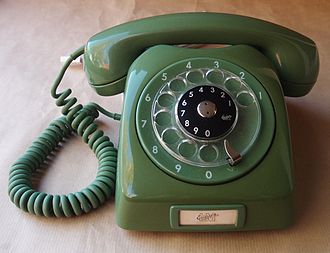
Courtesy of wikipedia.org
The email read, “Sorry. Those sweatpants are sold out. Do you want to order another style?” My answer was, “No.” But I thanked my friend who’d been willing to use her Nordstrom membership to shop for me electronically. I’d wanted to avoid opening an account of my own with yet another password. Nonetheless, I lusted for those sweatpants. Desperate, I called the local brick-and-mortar store and spoke to a clerk. She confirmed they didn’t have the style I wanted in the store but there was a pair at their warehouse.
“Eureka!” I cried as if I’d discovered the fountain of youth. Next, I spat out my credit card number.
Once again, my landline telephone had triumphed over online shopping. Success like that one explains why I’m devoted to the analog world. I admit, keeping the faith is a challenge. Retailers and governments eschew real-world connections. Perhaps they have an aversion to paper. That would explain why the IRS breaks into a sweat whenever I ask that my rebate be sent as a check. Direct deposit, they assure me is safer.
Charitable organizations have the same aversion. For years, I’ve mailed a contribution to Wikipedia, grateful for their service. Nowadays, they bury their address deep in the website and reserve prominent space for electronic contributions. Maybe they fear that during the time it takes to write a check, I’ll change my mind. Or, they might suppose that with my credit card on file, I’ll be tempted to make frequent contributions.
Some readers might roll their eyes as they read this confession. “Come into the real world, Caroline,” they might be thinking. If so, I would remind them that analog IS the real world. Digital is its unreliable mirror. What’s more, beyond lost data, scams, and chatbots, digital technology is creating so many problems that the best and brightest in the industry are scurrying to redesign analog chips in preference to digital. (Back to the Future, “ by Charles Platt, Wired, May 2023, pg. 84.)
Energy Security is their concern: the availability of sufficient electricity at affordable prices. (“The Age of Energy Insecurity,” by Jason Bordoff and Meghan L. O’Sullivan, Foreign Affairs, May/June 2023, pg. 105) The digital world is growing exponentially, but the real world hasn’t enough energy to support its growing appetite.
How is technology to bridge the gap? One solution would be to shift data storage from the electronic to the analog world. Storing data requires less energy than creating or finding things, which, in a time of conservation, makes the analog chip heaven-sent. But how are the two chips, digital and analog, to interface? That is the question.
Technology is pursuing an answer with the fervor of hounds after a wily fox. To everyone’s surprise, algorithms are of no use. Old-fashioned Calculus is what’s needed. Why? Because Calculus describes the real world better. (Wired, pg. 111.)
Even so, programmers face a conundrum akin to what scientists grapple with when they strive to explain how quantum physics and classical mechanics interface. One obstacle is that mathematics is precise while the real world is “muzzy,” as one expert described it. Not all that’s real seems willing to give up its complexity to a sequence of 0s and 1s,
While we wait for that problem to be solved, we can fret over another—the shortage of rare earth metals. Found in the middle of the periodic table, these elements have a fluorescence that gives them the conductive and magnetic properties vital to chipmaking. China and Russia have abundant supplies of rare earth metals, which, despite being dictatorships, give them leverage over their energy-poor neighbors. (Foreign Affairs, pg. 106-107) Some of these neighbors, like Lithuania, are working to wean themselves off Russia’s energy sources.
Happily, there’s good news for them and the rest of the world because we’re discovering that rare earth metals aren’t rare at all. They lie all around us. Those mud pies we made as kids might not have been edible, but they’ve gained respect since we’ve learned they contain the elements we need to make the analog and digital connection. So, here’s to dirt.
And here’s to the analog world, in general, otherwise known as reality. So, when I ignore my computer and reach for the phone to order a sweatshirt to match my new sweatpants, let no one smirk.
